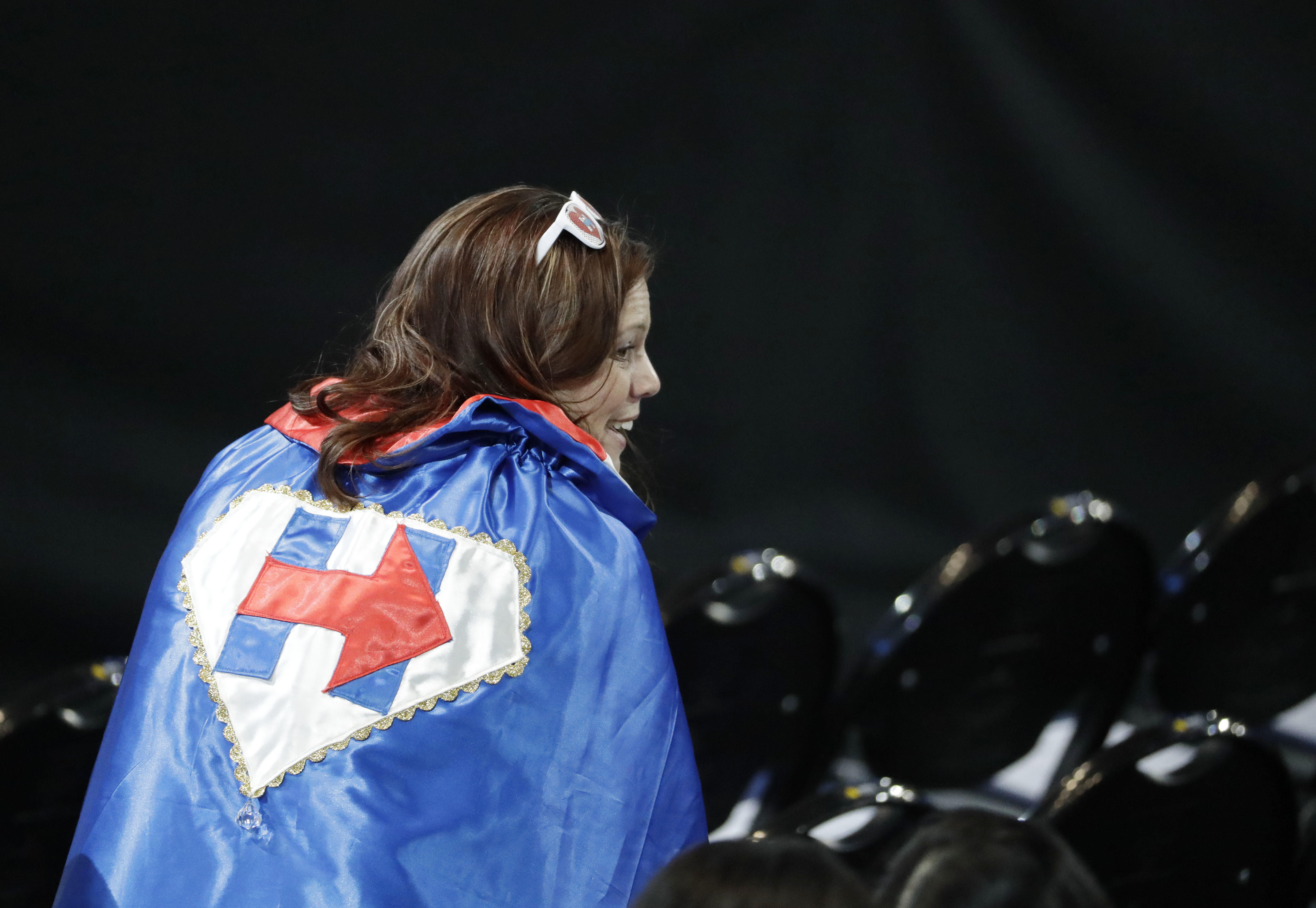It's time to light the next feminist fire
We can't just talk about it. Let's do something.


A free daily email with the biggest news stories of the day – and the best features from TheWeek.com
You are now subscribed
Your newsletter sign-up was successful
Their faces were tired and tear-streaked. They sat alongside men, to be sure, but to many of those watching on television, the young women in the bleachers and in the crowd at the Javits Convention Center on Manhattan's West Side commanded center stage as the camera panned over them, their tears flowing, their faces contorting to reveal the blows struck to their hearts.
The woman who was supposed to become the champion of women everywhere, of every woman who has ever been made to feel intimidated or lesser than or unworthy simply because she is a woman, was defeated in the race for the presidency.
That fact alone is the knife in the backs of millions of American women. But it's who she lost to that, for many, is the twist.
The Week
Escape your echo chamber. Get the facts behind the news, plus analysis from multiple perspectives.

Sign up for The Week's Free Newsletters
From our morning news briefing to a weekly Good News Newsletter, get the best of The Week delivered directly to your inbox.
From our morning news briefing to a weekly Good News Newsletter, get the best of The Week delivered directly to your inbox.
I'm a woman in her early 20s. I thought Nov. 8 would be a day I would remember with pride for the rest of my life. Instead, we all woke up Wednesday morning to a new reality in which alleged hate crimes against minority men and women are running rampant, in no small part because we just elected as president a man who marginalized and ridiculed these groups.
In Trump's America, American women will still wake up, every day, facing both conspicuous and symbolic forms of sexism and patriarchal oppression. Will reproduction rights be revoked entirely under Donald Trump's administration? We don't know yet. But we do know that Trump's incendiary comments toward women over the course of his campaign normalized objectification and sexual assault.
But there's a bright side here, too. Really.
Americans — especially those in my generation — now have an unprecedented responsibility and opportunity to advance the causes of women over the next four years, and beyond.
A free daily email with the biggest news stories of the day – and the best features from TheWeek.com
Clinton's loss and Trump's win may, albeit inadvertently, spur the next feminist wave that is already underway for today's millennial women and men and the generation of girls and boys behind them.
Our fight begins anew. First, we must galvanize ourselves and others to organize and demonstrate. Women of my generation have never before uniformly faced the same threats to our rights. Where there was previously complacency and even apathy, we must light a fire.
Legions of women in generations past fought to achieve the rights we take for granted, of course; it largely began with the first wave feminists who organized the first women's rights convention in Seneca Falls in 1848, where Elizabeth Cady Stanton drafted the 12-point Declaration of Sentiments, which called for equal treatment of men and women under the law, including suffrage for women. It wasn't until 1920, of course, when women's suffrage was signed into law as the 19th Amendment.
More than 40 years later, the Equal Pay Act passed in 1963 (though today, the wage gap still persists), and less than a decade later, in 1972, the Supreme Court legalized birth control for all in Baird v. Eisenstadt. One year later, women received the right to safe and legal abortion with the Roe v. Wade decision. The second wave of feminism was in full effect.
The third wave, in the mid-'90s and early 2000s, countered and sought to re-define more ambiguous and abstract concepts like gender, sexuality, and heteronormativity. But besides the wage gap, there have been few, if any, overt forms of inequality against women that have mobilized a national movement and gained national consciousness in close to 40 years.
It makes a certain kind of sense, then, that the majority of white women voted for Donald Trump, and that in 2013, a poll found that only 23 percent of women and 18 percent of men considered themselves feminists. Many of us have simply not grown up in an America where we have had to fight for basic legislative rights, and many others have been blind to the societal structures and systems that ensure the oppression of women.
On Election Night, The New Yorker's Alexandra Schwartz tweeted that "don't boo, organize" would be the new rallying cry of those who supported Clinton. And indeed, women have already begun organizing a "Million Women March" on Washington the day after Trump's inauguration in January. Countless other men and women have organized and participated in protests or created petitions, and local chapters of women's groups around the country have begun planning their next steps to mobilize.
The rest of us — men and women — must stay engaged and continue to show up. And we must pivot to focus on today's crop of young girls, many of whom stayed up late last Tuesday for the history they thought they'd see. To these girls, we have a responsibility: Teach them that inequality persists, and show them how to most effectively mobilize in response.
We have to teach them that, as author and filmmaker Jean Kilbourne notes in her books and documentaries, they are consistently targeted and objectified in the media, which contributes to the socialization that leads them to speak up less and generally make themselves smaller, both physically and metaphorically. As Kilbourne notes, girls and boys need media literacy courses in schools — especially after an election like this one in which ad hominem attacks on women became the norm — and they need to be supported and immersed in environments that encourage girls to speak up and lead.
We have to teach them that, yes, their mothers likely earn less money than their fathers simply because they are women. We have to teach them that survivors of rape and other forms of sexual assault have a right to be believed, especially when they tell their stories weeks, months, years, or even decades after they occurred, because rape trauma syndrome dictates that they probably will.
Once we build our networks, we have to bring these girls into them, and tell them to bring their friends. They have to know that their networks of women always have their backs. And we have to continue to bring them to protests and show them what it means to stand up for what they believe in.
In her 1969 commencement speech at Wellesley College, a young Hillary Clinton told her classmates, "Fear is always with us, but we just don't have time for it. Not now."
Today, young American women are facing the strongest threats to our freedom, respect, and equality under the law that we've faced in our lives. And yes, Clinton's narrow loss is bad for women, and the man she lost to no doubt compounds it.
But I am convinced that doing nothing in response is worse. We can't just talk about it. Let's do something.
Julianne McShane is a student at New York University in the Global Liberal Studies program. She has interned at The Week, The Improper Bostonian, and NBC News. She plans to pursue a career in journalism after graduating.
-
 The ‘ravenous’ demand for Cornish minerals
The ‘ravenous’ demand for Cornish mineralsUnder the Radar Growing need for critical minerals to power tech has intensified ‘appetite’ for lithium, which could be a ‘huge boon’ for local economy
-
 Why are election experts taking Trump’s midterm threats seriously?
Why are election experts taking Trump’s midterm threats seriously?IN THE SPOTLIGHT As the president muses about polling place deployments and a centralized electoral system aimed at one-party control, lawmakers are taking this administration at its word
-
 ‘Restaurateurs have become millionaires’
‘Restaurateurs have become millionaires’Instant Opinion Opinion, comment and editorials of the day
-
 The billionaires’ wealth tax: a catastrophe for California?
The billionaires’ wealth tax: a catastrophe for California?Talking Point Peter Thiel and Larry Page preparing to change state residency
-
 Bari Weiss’ ‘60 Minutes’ scandal is about more than one report
Bari Weiss’ ‘60 Minutes’ scandal is about more than one reportIN THE SPOTLIGHT By blocking an approved segment on a controversial prison holding US deportees in El Salvador, the editor-in-chief of CBS News has become the main story
-
 Has Zohran Mamdani shown the Democrats how to win again?
Has Zohran Mamdani shown the Democrats how to win again?Today’s Big Question New York City mayoral election touted as victory for left-wing populists but moderate centrist wins elsewhere present more complex path for Democratic Party
-
 Millions turn out for anti-Trump ‘No Kings’ rallies
Millions turn out for anti-Trump ‘No Kings’ ralliesSpeed Read An estimated 7 million people participated, 2 million more than at the first ‘No Kings’ protest in June
-
 Ghislaine Maxwell: angling for a Trump pardon
Ghislaine Maxwell: angling for a Trump pardonTalking Point Convicted sex trafficker's testimony could shed new light on president's links to Jeffrey Epstein
-
 The last words and final moments of 40 presidents
The last words and final moments of 40 presidentsThe Explainer Some are eloquent quotes worthy of the holders of the highest office in the nation, and others... aren't
-
 The JFK files: the truth at last?
The JFK files: the truth at last?In The Spotlight More than 64,000 previously classified documents relating the 1963 assassination of John F. Kennedy have been released by the Trump administration
-
 'Seriously, not literally': how should the world take Donald Trump?
'Seriously, not literally': how should the world take Donald Trump?Today's big question White House rhetoric and reality look likely to become increasingly blurred
